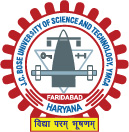Controller of Finance: Sh. Ravi Kumar Sharma
- List of Office Bearers
- Finance Committee
- Funds / Grants received from government during the last five years for development and maintenance of infrastructure
Important Documents:
Utilization Certificate from 2013-14 to 2016-17
Revised Budget Summary 2014-15 to 2017-18
The power and duties of Chief Finance Officer of the University as per statues:
|
(1) The Controller of Finance shall be a whole-time salaried officer of the University and shall be appointed by the Executive Council on the commendation of Vice-Chancellor on such terms and conditions, as may be prescribed by the Statutes. (2) The Controller of Finance shall be the ex-officio Secretary of the Finance Committee but shall not be deemed to be a member of such committee. (3) When the office of the Controller of Finance is vacant or when the Controller of Finance is by reason of illness or any other cause is unable to perform the duties of his office, the duties of the office shall be performed by such person, as the Vice-Chancellor may appoint for the purpose. (4) The Controller of Finance shall— (a) exercise general supervision over the funds of the University arid shall advise the University as regards its financial policy; and (b) perform such other functions, as may be assigned to him by the Executive Council or as may be prescribed by the Statutes. (5) Subject to the control of the Executive Council, the Controller of Finance shall— (a) hold and manage the property and investments of the University including trust and endowed property; (b) ensure that the limits fixed by the Finance Committee for recurring and non-recurring expenditure for a year are not exceeded and that ali moneys are expended on the purpose for which they are granted or allotted; (t) be responsible for the preparation of annual accounts and the budget of the University and for their presentation to the Executive Council; (d) keep a constant watch on the state of the cash and bank balances and on the state of investments; (e) watch the progress of the collection of revenue and advise on the method of collection to be employed; (f) ensure that registers of buildings, land, furniture and equipment are maintained up-to-date and that stock checking of equipment and other connected material in all offices, special centres, specialized laboratories, and colleges and institutions maintained by the University is conducted;? (g) bring to the notice of the Vice-Chancellor any unauthorized expenditure and other financial irregularities and suggest action to be taken against the person responsible for it; and (h) call for from any officer, center, laboratory', college or institution maintained by the University, any information or returns that he may consider necessary for the performance of his duties. (6) The receipt of the Controller of Finance or person duly authorized in this behalf by the Executive Council for any money payable to the University shall be sufficient discharge for payment of such money. |
|
The Responsibilities of Finance Officer of the University: (a) the Finance Officer of the University shall:
Provided that the Finance Officer shall not incur any expenditure or make any investment exceeding one lakh of rupees without the prior approval of the competent authority. (b) Subject to the control of the Vice-Chancellor and the Executive Council, the Finance Officer shall:
Self Financing Scheme |






